Chances are you likely have some questions or concerns about medical cannabis. In this section, we’ve covered some of the most frequently asked questions:
If you’re using medical cannabis for your disabling and chronic symptoms, you may question whether the herb is safe for long-term use and/or if it’s addictive. Conducted studies show cannabis is safe for long-term use with fewer adverse side effects and less risk of addiction when compared to prescription drugs like opioids.
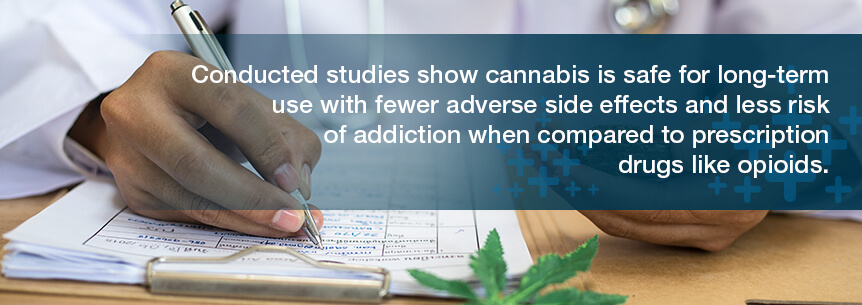
But, marijuana addiction, although it probably shouldn’t come under that label, does exist. It’s a different type of addiction than opioid abuse or alcoholism. In a traditional sense, dependency on cannabis doesn’t look the same as alcohol or prescription drug addiction as it doesn’t include the withdrawal symptoms and physical side effects. A better way to describe marijuana addiction would be having a psychological dependence on it.
When you’re using the drug on a regular basis, it can become part of your routine where you could become psychologically fixated on it. According to the National Institute on Drug Abuse, individuals who start to use cannabis before they turn 18 years old are four times more likely to depend on the drug than adults.
But, unlike other addictions, you don’t get the harmful psychological or physical symptoms. Typically, an unhealthy dependence on weed may include:
So, it is important to note while no deaths have occurred due to marijuana use, moderation is essential. You can avoid this type of dependency by working a treatment plan out with your physician or medical cannabis dispensary budtender. Also, keep in mind those using medical marijuana responsibly to treat their health conditions like chronic pain show an improvement in their quality of life.
You may have heard claims cannabis use is likely to come before the use and addiction of other illicit and licit substances. In fact, you’ve probably already heard of the marijuana gateway drug theory from those supporting this misconception. These people claim smoking cannabis naturally leads to harder drug use, but what they didn’t mention is marijuana isn’t the first drug of choice by teens.
While weed is typically the first “illegal drug” teens (and others) use, it is still fourth on the choice of drug list they use. And, looking at this “Gateway Theory”, you’d see pot isn’t the guilty party here. The order of use is:
They’re probably third on the list since many teens can easily get them from their medicine cabinets at home.
Among the biggest U.S. public health issues is the opioid crisis. Opioids not only serve as a gateway drug to harder drugs like heroin, but they can also lead to addiction — and worse, overdose. Every day, health officials are searching for a solution to this ever-growing problem, and medical marijuana may be part of the solution.
It only took a little more than an hour for the mention of medical application of marijuana as a solution to the opioid epidemic by subcommittee members in a Senate hearing. A cited NIH study found states making medical marijuana legal showed an almost 25 percent lower opioid overdose mortality rate annually.
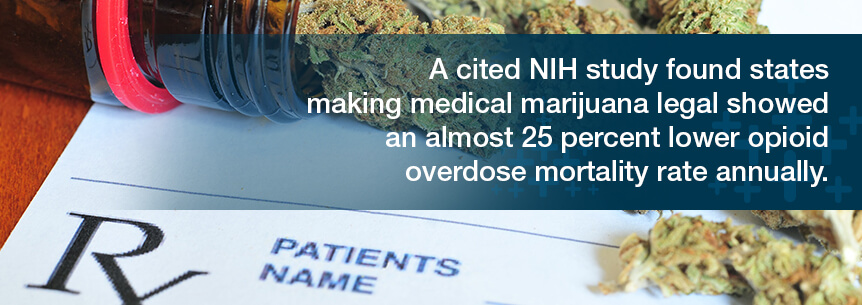
Since the legalization of medical marijuana in the U.S., the drug hasn’t shown any signs of being a gateway drug. Numerous studies show criminalization and prohibition are primary factors leading to the use of harder drugs. Prescription medications seem to be the most harmful step toward drug abuse. Prescription drug fatalities, in general, are greater than firearm and vehicle accidents combined.
Regardless of whether people use it for its euphoric or therapeutic properties, it has the potential of producing a variety of psychological and physical side effects. Not all people experience the same effects. The reactions often depend on what type of marijuana you consume and the way you consume it. Still, it’s a good idea to have some knowledge of potential side effects of the drug in case you do experience any.
Marijuana’s main effect many people are already familiar with is its “euphoric high” which is a psychoactive response to the THC in it. The cannabinoid THC gets into your bloodstream, eventually interacting with your brain cell receptors. If you don’t want this euphoric side effect, you can find strains low in THC and high in CBD.
Cannabis strains containing high THC amounts may:
The amount of cannabis you consume with THC impacts the length of time it takes you to develop these effects. For those who are seeking marijuana’s natural health benefits without the psychoactive effects, they can choose strains with little or no THC.
The CBD cannabinoid is also commonly found in cannabis and hemp, and it’s not psychoactive like THC.
The side effects of medical weed are mild. But, synthetic marijuana is another story. Synthetic weed typically imports from Asian countries and sells by the names:
Synthetic weed is not natural like regular marijuana. Rather, it’s a synthetic powder manufactured in a lab and imported to the United States where retailers then spray it on spices, herbs or leaves. You smoke it just like you would weed. It also binds to your body’s cannabinoid receptors like marijuana, but it’s up to 1,000 times stronger than regular weed, making it very dangerous. While you can’t overdose on genuine marijuana, you absolutely can overdose on synthetic weed.
Even though marijuana continues to remain federally illegal in the U.S., numerous states have made the drug legal for valid medical reasons. As of the end of December 2017, 29 states plus the District of Columbia have legalized medical marijuana.
With a doctor’s recommendation, you can:
California was the first state in the union to legalize medical use of cannabis as voters in the state passed Proposition 215 in the year 1996. The Institute of Medicine, responding to California’s Proposition 215, issued a report analyzing marijuana’s potential therapeutic uses. According to the report, there was potential therapeutic value found by scientific data of cannabinoid drugs, especially THC, for:
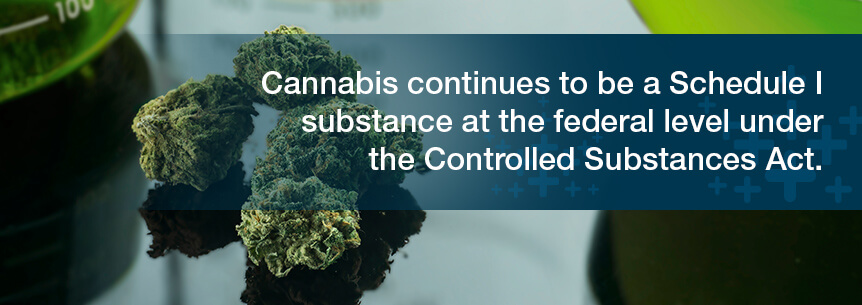
Cannabis continues to be a Schedule I substance at the federal level under the Controlled Substances Act. Under this act, Schedule I substances are believed to have no accepted medical use and a higher potential for addiction. This makes cannabis distribution a federal offense. However, in 2009, the Obama Administration encouraged federal prosecutors in a memo to not prosecute individuals distributing cannabis for medical reasons conforming to state law.
Attorney General Sessions, in January 2018, issued a memo regarding marijuana enforcement allowing federal prosecutors the ability to decide how they’d like to prioritize federal marijuana law enforcement. They encouraged U.S. attorneys to weigh all relevant factors such as:
To stay safe, go over your legal medical cannabis laws and state qualifications thoroughly. Each state legalizing medical marijuana has its own process involving how you obtain your medical marijuana card. Each state has rules involving its medical marijuana program and whether you can benefit from — and are approved for — medical cannabis to treat your health condition and improve your quality of life.
Here is a current list of states that have legalized medical cannabis and have a state medical cannabis program in place.
People are increasingly recognizing the benefits of medical weed and are using it to relieve their suffering and improve their quality of life. Those struggling with a disabling condition may finally get the relief with marijuana products they haven’t been getting from traditional treatments.
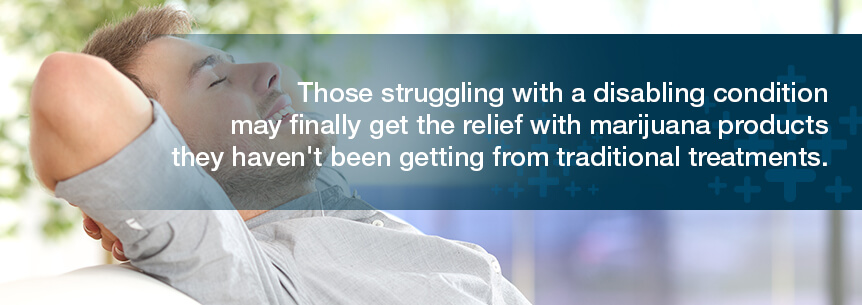
Many ailments and conditions have been approved by states for the use of medical marijuana as we discussed in chapter five. Some common conditions medical weed helps treat include:
Many arthritis patients are now seeking out medical pot to help relieve their symptoms. With marijuana treatment, they are experiencing outstanding results, including:
Many conditions can cause chronic pain, including:
Doctors usually prescribe opioid narcotics like Percocet and Vicodin to treat severe chronic pain. Narcotics and opiates can relieve severe pain effectively, but they come with significant harsh side effects and are highly addictive. Medical marijuana is an effective treatment for chronic pain, and it is much safer than opioids.
Several studies researching medical weed show it has promising results as an anti-cancer treatment. For example, certain components of the marijuana plant show promise in stimulating tumor cell death (apoptosis) and may even be able to hinder cancer tumor growth in numerous types of cancers like breast, brain and liver cancers.
Some conditions aren’t as common, but medical marijuana might still provide relief for:
The list of common and uncommon medical conditions cannabis treats goes on and on. You can refer to our comprehensive list to see if you can relieve your symptoms of your health condition with this miracle herb.
Once you obtain your recommendation and/or card, you’re qualified to enter marijuana dispensaries and purchase cannabis products. With so many consumption options available to you, you might be wondering, how do you ingest medical marijuana?
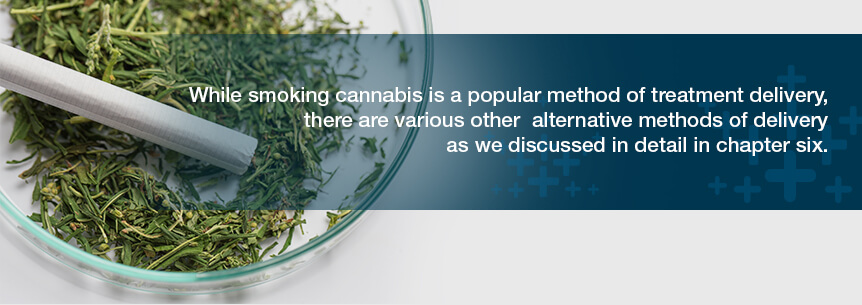
While smoking cannabis is a popular method of treatment delivery, there are various other alternative methods of delivery as we discussed in detail in chapter six — each having its own benefits and drawbacks.
Ways to take medical marijuana include:
If you are searching for a healthy way to consume cannabis, there are some things to consider:
Start With Low Doses
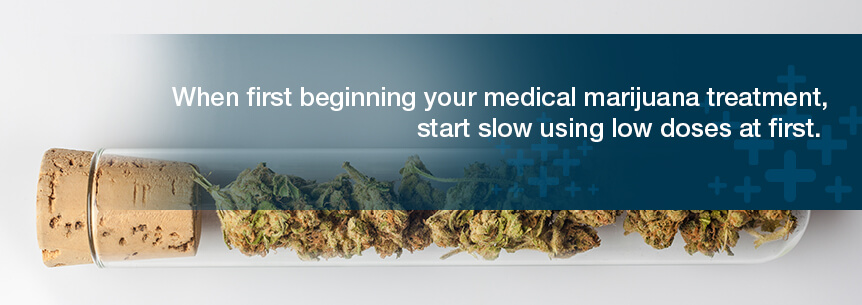
When first beginning your medical marijuana treatment, start slow using low doses at first. Gradually take in more until you reach your desired effect. Since you don’t always feel the effects of the herb immediately, going slow with smaller doses is a good way to “get a feel” for your new treatment and gradually work your way up to a regular treatment plan.
Medical marijuana is safe overall with little to no risk of overdose. But, you still need to be cautious until you completely understand its effects and find the right dose for your symptoms.
To learn more about the different ways you can consume your medical cannabis treatment, refer to Chapter 6 of this guide.
When looking for a medical marijuana doctor or clinic, your one-stop resource is MarijuanaDoctors.com. All doctors on their website are fully screened, guaranteeing you strict state law compliance.
Not all doctors approve of medical cannabis. Some may even refuse to give you a written recommendation, thinking other treatments will provide you with more benefits.
All doctors listed on MarijuanaDoctors.com believe in cannabis’s therapeutic benefits and will be more inclined to give you a required recommendation than your primary care physician or other doctors. A good first step is to contact a willing doctor who believes in the powerful effects of medical cannabis.
Chances are, you’ll have a few questions about medical cannabis or your state’s laws surrounding it. Or, maybe you just need help finding the right doctor you feel comfortable with. Either way, MarijuanaDoctors.com is here to help. You can begin the process by choosing the state you live in, click “find a doctor,” and the website will take you step by step from there.